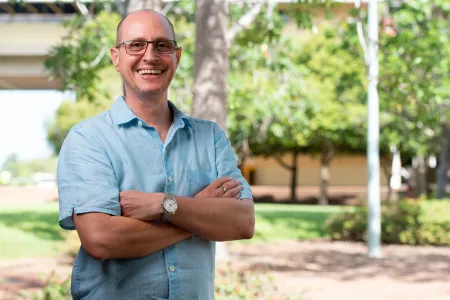News
Researchers at CDU some of the most influential in their fields
Charles Darwin University (CDU) researchers have maintained their international reputations as some of the most influential in the world.
According to a Stanford University study, there were 22 academics from CDU and Menzies School of Health research who ranked in the top two per cent of researchers referenced in their respected disciplines for 2020.
The Stanford University and Elsevier BV study, which tallies the citation, references, and authorships of more than 100,000 past and present researchers, was updated at the end of October and published in the journal PLOS Biology.
Last year, the University had 21 academics in the upper echelon of influential researchers.
The researchers to achieve the top gongs this year were from a wide variety of fields, including ecology, network and communication, microbiology, nursing, environmental engineering, tropical medicine, and accounting.
CDU Professor of Accounting Indra Abeysekera said making the top two per cent in the accounting field and the broader area of business management was extremely challenging.
“Accounting is a profession, and there is the emphasis that research must impact the wider group of stakeholders,” Professor Abeysekera said.
“Before joining academia, I worked in the private and public sectors, had an experiential appreciation of stakeholder issues, and conducted empirically sound research that impacts stakeholders.”
Professor Abeysekera has been on the list in previous years, but for CDU Professor in Mental Health Daniel Bressington, this is the first time making the list of the most influential researchers.
Professor Bressington said making the list for the first time was a privilege.
“It’s difficult to get into the top two per cent. In this discipline there are many researchers who are known around the world; therefore, your research outputs need to be of excellent quality in order to make an impact,” Professor Bressington said.
Professor Bressington contributes his time and expertise to journals that publish mental health research, including as an academic editor at Plos One (clinical trials), associate editor at Frontiers in Psychiatry, and an editorial board member at the Journal of Psychiatry and Mental Health Nursing.
“I would like to see, and work towards, better reporting of clinical trials, particularly those conducted by nurses,” he said.
“A key area for mental health moving forward is to look at the relationship between mental and physical health.”
CDU Pro Vice-Chancellor Research and Innovation Dr Steve Rogers said that this Stanford University study underpins the role of research in building CDU’s reputation.
“Research is a key part of CDU’s strategic plan and we’re delivering quality research across a whole range of disciplines,” Dr Rogers said.
“Now with more focus on impactful research at CDU, we would expect to see more of our researchers in this list in coming years.”
Dr Rogers said he would also like to see more women on this list in the future.
Menzies Director Professor Alan Cass AO said the school of health research aims to conduct the highest quality research addressing health problems that matter.
“Menzies staff also work as doctors, nurses and scientists in the hospitals and clinics where we conduct our research. For more than 36 years our research has delivered real health benefits to northern Australia and our global region,” Professor Cass said.
See the full list of top researchers in the Elsevier BV article.
Related Articles

First “hype cycle” of AI development put tech above humans
Users around the world have rushed to adopt artificial intelligence - especially in safety-critical fields - but a new study has revealed the hype has prioritised technology for technology’s sake instead of human-centred development.
Read more about First “hype cycle” of AI development put tech above humans
Nanoplastics hindering cognitive abilities of fish, international research shows
Nanoplastic exposure can impair the cognitive abilities of fish and could lead to significant impacts on marine species’ ability to survive, according to a new international study.
Read more about Nanoplastics hindering cognitive abilities of fish, international research shows
New project to grow Indigenous aquaculture on one of Australia’s largest islands
An Australian island’s efforts to improve food security and transition into a blue economy will be bolstered by a new project to propagate a nutritious and increasingly popular fish.
Read more about New project to grow Indigenous aquaculture on one of Australia’s largest islands
